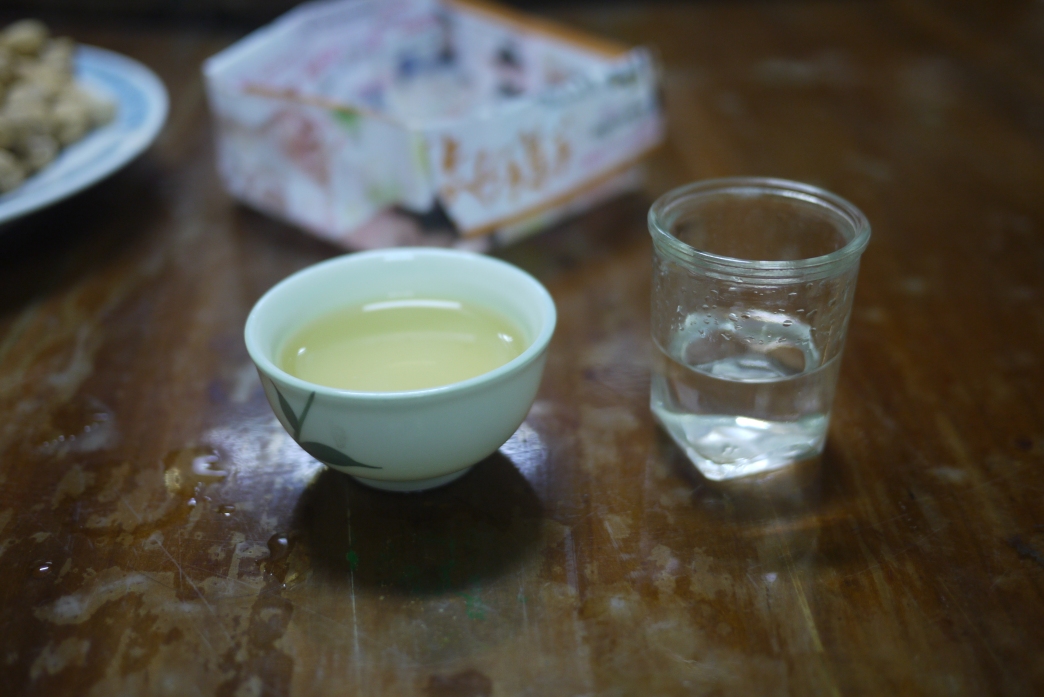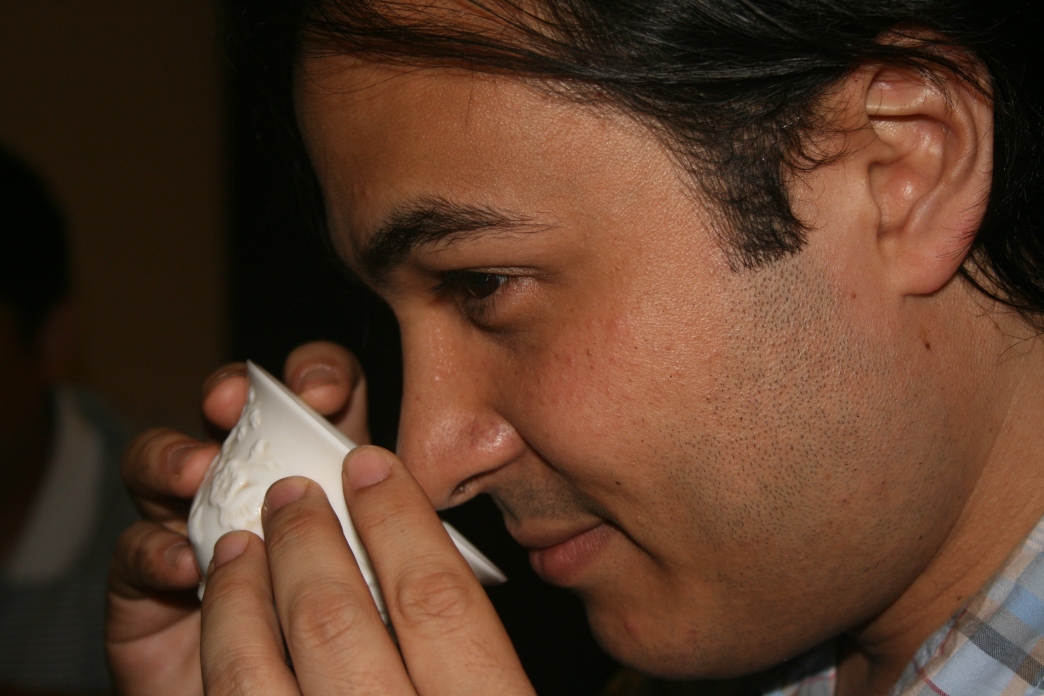Tea has quite rightly been the darling of recent clinical research and much-lauded in the press for its impressive list of health properties. It seems that modern science is catching up with the empirical Eastern traditional knowledge that tea is incredibly good for health and more and more people are turning to tea as part of a healthier lifestyle.
No doubt, I will be using this blog in the future to discuss the proven health benefits of tea in order to help sort the truth from the marketing hype but today I want to write about my personal and perhaps more irreverent approach to tea. I want to talk about getting tea drunk!
Tea has acquired a sort of ‘goody goody’ image in the West and whilst I do not want in any way to detract from the wholesome attributes of tea, this image belies the indulgent and enjoyable psychoactive effects of tea. Coffee houses have for decades been trading off the stimulant effect of its drinks, pushing the buttons of the natural human instinct to get a ‘buzz’.
The tea marketeers, on the other hand, are presenting tea as the ‘healthy alternative’ to coffee – its clear skinned and bright eyed sister wearing a continuous health halo. But to pigeon-hole tea in this way does it a disservice. It may suit the neat marketing angles of the Teavana’s of this world but it is not the truth of tea.
At its core, tea is a potent herbal drug with a cocktail of natural stimulants and mood enhancers far more complex in effect than coffee. The big psychoactive compounds in tea are Caffeine, L-Theanine, GABA and Catechins.
Caffeine (in a fixed state) gives you a sustained energy boost and mental awakening. L-Theanine crosses the blood-brain barrier and effects dopamine receptors to make you feel more relaxed and improve mood and creative thought by stimulating alpha brain wave activity. The L-theanine is converted in the brain to GABA which acts as a powerful brake on the nervous system to calm and relax and improve brain function. Tea itself contains extra GABA which is absorbed by the gut and can again alter brain chemistry and your nervous system.
Catechins have been shown to bind to the CB1 and CB2 receptors of your endo-cannabinoid system for an extra feel good and rewarding high sensation.
The result? Tea contains both powerful stimulants and relaxants that work synergistically to have a profound and unique effect – awake yet relaxed, high yet grounded, clear minded yet with an abstract creativity. This combination of activators and inhibitors in one plant is not entirely unique – marijuana and psychedelic mushrooms have a similar synergistic effect on the body caused by functionally opposing compounds. Do you see where I am going here?
If some of you are thinking that I am just creating another marketing angle to sell Mei Leaf tea then I would simply point you back to the origin of tea – China. Tea was first widely cultivated in the Western Chinese province now known as Yunnan. Interestingly, Cannabis was first cultivated in the world by the Chinese as a medicinal herb from exactly the same region and in exactly the same era (first text mentioning cannabis in China dates to 2727BC, just ten years after tea drinking was fabled to be discovered).
This region is very close to the Golden Triangle of opium cultivation, another powerful psychoactive plant. Therefore tea has a dateline and provenance directly linked to the cultivation of psychoactive plants.
The buddhist monks have used tea for centuries for its ability to enhance meditation through its effect on alpha brain waves, relaxation and mental alertness combined with its stimulating effect, meaning that monks could meditate longer without food. This is assumed to be one of the main reasons why tea seeds were brought back to Japan from China by buddhist monks to start Japanese tea production.
The ancient Chinese poets of the Song and Tang Dynasty (Lu Tong, Chio Jen, Su Dong Po) used tea as their muse to craft their words in the same way as artists have always tended towards encouraging altered states to find inspiration:
The Way Of Tea (excerpt)
by Chio Jen
With its clear bright froth and fragrance,
It was like the nectar of Immortals.
The first bowl washed the cobwebs from my mind –
The whole world seemed to sparkle.
A second cleansed my spirit
Like purifying showers of rain,
A third and I was one of the Immortals –
What need now for austerities
To purge our human sorrows?
Worldly people, by going in for wine,
Sadly deceive themselves.
For now I know the Way of Tea is real.
The Chinese tea ceremony is often regarded in the West as an artistic and symbolic performance but fundamentally it was created to brew extremely strong and highly aromatic tea. Why do you think the cups for tea ceremony are so small? These are tea ‘shots’ to be tasted and enjoyed yet designed to give the maximum psychoactive impact.
So if you travel to China and witness people sitting for hours talking, laughing and drinking tea ceremony style, this is equivalent to people sitting in a pub or sharing a joint with friends. They are using tea in exactly the same way. Often you will find their teeth stained a bright red from chewing Betel nuts for added stimulant effect. The Chinese even have a name for getting tea drunk – Cha Zui.
So I am guessing many of you are saying ‘I drink loads of tea but I have never felt drunk’. The fact is that the West does use tea for its psychoactive properties, this is why when there is a problem there is a tendency for us to put the kettle on. However, the way that most of us are brewing, and the types of tea that we drink mean that we hardly ever get the true effect of tea as experienced by those in the know.
The first time I ever truly became tea drunk was, fittingly, in Xishuangbanna Yunnan province (the birthplace of tea) sipping a fine aged Pu’Erh. I remember sitting and tasting Gong Fu style and after just a few small strong cups I felt euphoric, excited, giggly, light-headed and like my body was moving in slow motion.
It was a moment of revelation as I saw the tea farmer grinning in front of me, clearly feeling the same effects. We were getting high together. A completely different aspect of tea understanding opened up and I felt like I had been initiated into the inner circle of tea, a secret from the hill tribes of China that was being kept from the rest of the world – tea as a drug, tea as a stimulant for social and spiritual interaction, tea as a lubricant for artistic creativity.
The way that I looked at tea changed dramatically that night and I have tried to reflect that change in the tea that I source and my approach to Mei Leaf. Watching farmers in their misty mountain homes pulling out their tea for a tasting ‘session’ takes on a brand new meaning for me. This is like their personal crop of cannabis that they have lovingly grown in their terroir from their favourite cultivars and I sample them for their flavour and their effect – warming, refreshing, energetic, spacey, creative, focused – I try to discern the energetic and psychoactive qualities of the tea just as much as their taste, aroma or mouthfeel.
I have found that since adopting this approach, the tea farmers are happier to bring out their higher quality tea, after all, what’s the point in wasting prime tea on someone who does not truly appreciate it? The leaves cease being a commodity and instead become a shared experience between grower and buyer. It makes for stronger bonds and the building of trust.

Sometimes the tea farmers serve tea shots with moonshine alcohol. The GABA content in tea increases the alcohol’s effect.
For all of tea’s indulgent and drug like qualities, it is incredibly good for your physical health with no upper limit. How often in life can you find something that gives so much enjoyment on a sensorial, emotional and spiritual level which is actually good for you too? So keep drinking and let’s get high guilt-free. Cheers!
--------
The PuErh tea in this video is Bloom Buster.
The aged white tea is part of Don's private collection but we have a similar aged white called Jade Star.




